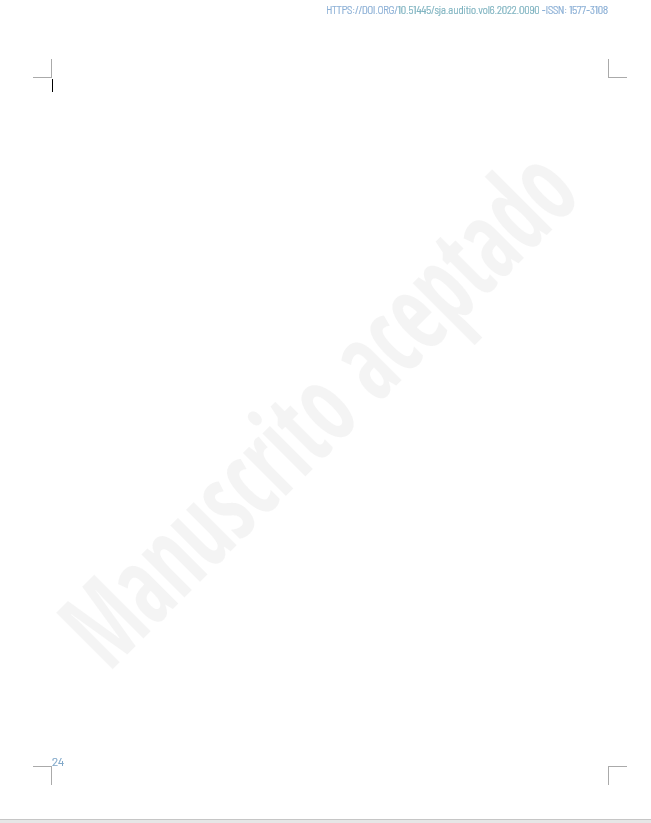Abordaje clínico de la estimulación facial en implantes cocleares
DOI:
https://doi.org/10.51445/sja.auditio.vol6.2022.0090Palabras clave:
nervio facial, implante coclear, estimulación eléctrica, pulsos eléctricos, modos de estimulaciónResumen
El implante coclear es actualmente uno de los dispositivos de rehabilitación neurosensoriales más exitosos. El mismo brinda la posibilidad de escuchar en personas con hipoacusias severas a profundas que obtienen limitado acceso a los sonidos con amplificación acústica. Sin embargo, existen complicaciones luego de su implantación, entre las cuales se encuentra la estimulación indeseada del nervio facial. Entre los principales detrimentos que produce la estimulación del nervio facial se encuentran los movimientos involuntarios de cara o cuello, molestia o dolor al usar el implante, entre otros. En algunos casos esto sucede sólo en algunos contactos, pero también puede presentarse en la mayoría o incluso todos los canales de estimulación.
El actual abordaje clínico de este problema recurre principalmente a diferentes cambios en la programación del dispositivo. Los recursos para reducirlo abarcan desde cambios en el tipo y modo de la estimulación eléctrica, hasta considerar la reimplantación en casos complejos. El presente artículo describe el problema de la estimulación facial y sus posibles causas, como así también detalla las soluciones clínicas que existen en la actualidad. Por último, se discuten nuevos abordajes y potenciales líneas de investigación.
Descargas
Visibility and Altmetrics
Métricas
Estadísticas globales ℹ️
|
1581
Visualizaciones
|
3970
Descargas
|
|
5551
Total
|
|
Citas
Abdelhamed, M. Z. (2019). Evaluation of the Triphasic Pulse Stimulation in Eliminating Facial Nerve Stimulation in Cochlear Implant Recipients. Glob J Oto, 19(2); https://doi.org/10.19080/GJO.2019.19.556007
Ahn JH, Oh SH, Chung JW, Lee KS. (2009). Facial nerve stimulation after cochlear implantation according to types of Nucleus 24-channel electrode arrays. Acta Otolaryngol, 129(6):588-91. https://doi.org/10.1080/00016480802325965
Alhabib S, Abdelsamad Y, Yousef M & Alzhrani F. (2021). Performance of cochlear implant recipients fitted with triphasic pulse patterns. Eur Arch Otorhinolaryngol, 278(9):3211-3216. https://doi.org/10.1007/s00405-020-06382-0
Aljazeeri IA, Khurayzi T, Al-Amro M, Alzhrani F, Alsanosi A. (2021). Evaluation of computed tomography parameters in patients with facial nerve stimulation post-cochlear implantation. Eur Arch Otorhinolaryngol, 278(10):3789-3794. https://doi.org/10.1007/s00405-020-06486-7
Alzhrani F, Halawani R, Basodan S, Hudeib R. (2020). Investigating facial nerve stimulation after cochlear implantation in adult and pediatric recipients. Laryngoscope, 131(2):374-379. https://doi.org/10.1002/lary.28632
Assiri M, Khurayzi T, Alshalan A, Alsanosi A. (2022). Cochlear implantation among patients with otosclerosis: a systematic review of clinical characteristics and outcomes. Cochlear implantation among patients with otosclerosis: a systematic review of clinical characteristics and outcomes, 279(7):3327-3339. https://doi.org/10.1007/s00405-021-07036-5
Badenhorst W, Hanekom T, Gross L, Hanekom JJ. (2021). Facial nerve stimulation in a post-meningitic cochlear implant user: using computational modelling as a tool to probe mechanisms and progression of complications on a case-by-case basis. Cochlear Implants Int, 22(2):68-79. https://doi.org/10.1080/14670100.2020.1824431
Bahmer A, Adel Y, Baumann U. (2017). Preventing Facial Nerve Stimulation by Triphasic Pulse Stimulation in Cochlear Implant Users: Intraoperative Recordings. Otol Neurotol, 38(10):e438-e444. https://doi.org/10.1097/MAO.0000000000001603
Bahmer A, Baumann U. (2016). The underlying mechanism of preventing facial nerve stimulation by triphasic pulse stimulation in cochlear implant users assessed with objective measure. Otol Neurotol, 37(9):1231-7. https://doi.org/10.1097/MAO.0000000000001156
Battmer R, Pesch J, Stöver T, Lesinski-Schiedat A, Lenarz M, Lenarz T. (2006). Elimination of facial nerve stimulation by reimplantation in cochlear implant subjects. Otol Neurotol, 27(7):918-22. https://doi.org/10.1097/01.mao.0000235374.85739.c6
Bergstrom, L. (1975). Some pathologies of sensory and neural hearing loss. Can J Otolaryngol Suppl, 2:1-28.
Berrettini S, Vito de A, Bruschini L, Passetti S, Forli F. (2011). Facial nerve stimulation after cochlear implantation: our experience. Acta Otorhinolaryngol Ital, 31:11–6.
Bonnet RM, Frijns JH, Peeters S, Briaire JJ. (2004). Speech recognition with a cochlear implant using triphasic charge-balanced pulses. Acta Otolaryngol, 124(4):371-5. https://doi.org/10.1080/00016480410031084
Braun K, Walker K, Surth W, Lowenheim H & Tropitzsch A. (2019). Triphasic Pulses in Cochlear Implant Patients With Facial Nerve Stimulation. Starnberg : Otol Neurotol, 40(10):1268-1277. https://doi.org/10.1097/MAO.0000000000002398
Burck I, Helal RA, Naguib NNN, Nour-Eldin NA, Scholtz JE, Martin S, Leinung M, Helbig S, Stöver T, Lehn A, Vogl TJ. (2022). Postoperative radiological assessment of the mastoid facial canal in cochlear implant patients in correlation with facial nerve stimulation. Eur Radiol, 32(1):234-242. https://doi.org/10.1007/s00330-021-08128-w
Carlyon RP, Deeks JM, Macherey O. (2013). Polarity effects on place pitch and loudness for three cochlear-implant designs and at different cochlear sites. J Acoust Soc Am, 134(1):503-9. https://doi.org/10.1121/1.4807900
Chen J, Chen B, Zhang L, Li Y. (2021). Severe and persistent facial nerve stimulation after cochlear implantation in a patient with cochlear-facial dehiscence: a case report. J Int Med Res, 49(11):3000605211057823. https://doi.org/10.1177/03000605211057823
Ching TY, Day J, Van Buynder P, Hou S, Zhang V, Seeto M, Burns L, Flynn C. (2014). Language and speech perception of young children with bimodal fitting or bilateral cochlear implants. Cochlear Implants Int, 15 Suppl 1(0 1):S43-6. https://doi.org/10.1179/1467010014Z.000000000168
Cohen NL, Hoffman RA, Stroschein M. (1998). Medical or surgical complications related to the nucleus multichannel cochlear implant. Ann Otol Rhinol Laryngol, 97:8–13; https://doi.org/10.1016/j.ijporl.2020.109984
Dang, K. (2017). Electrical conduction models for cochlear implant stimulation. HAL Open Science.
Eisenberg LS, House WF. (1982). Initial experience with the cochlear implant in children. Ann Otol Rhinol Laryngol Suppl, (2 Pt 3):67-73.
Eitutis ST, Carlyon RP, Tam YC, Salorio-Corbetto M, Vanat Z, Tebbutt K, Bardsley R, Powell HRF, Chowdhury S, Tysome JR, Bance ML. (2022). Management of Severe Facial Nerve Cross Stimulation by Cochlear Implant Replacement to Change Pulse Shape and Grounding Configuration: A Case-series. Otol Neurotol, 43(4):452-459. https://doi.org/10.1097/MAO.0000000000003493
Erixon E, Högstorp H, Wadin K, Rask-Andersen H. (2009). Variational anatomy of the human cochlea: implications for cochlear implantation. Otol Neurotol, 0(1):14-22. https://doi.org/10.1097/MAO.0b013e31818a08e8
Espahbodi M, Sweeney AD, Lennon KJ, Wanna GB. (2015). Facial nerve stimulation associated with cochlear implant use following temporal bone fractures. Am J Otolaryngol, 36(4):578–582; https://doi.org/10.1016/j.amjoto.2015.04.003
Fan-Gang, Z. (2022). Celebrating the one millionth cochlear implant. JASA Express, Lett. 2, 077201; https://doi.org/10.1121/10.0012825
Frijns JH, Kalkman RK, Briaire JJ. (2009). Stimulation of the facial nerve by intracochlear electrodes in otosclerosis: a computer modeling study. Otol Neurotol, 30(8):1168-74. https://doi.org/10.1097/MAO.0b013e3181b12115
Geers AE, Moog JS. (1991). Evaluating the benefits of cochlear implants in an education setting. Am J Otol, 12 Suppl:116-25.
Hatch JL, Rizk HG, Moore MW, Camposeo EE, Nguyen SA, Lambert PR, Meyer TA, McRackan TR. (2017). Can Preoperative CT Scans Be Used to Predict Facial Nerve Stimulation Following CI? Otol Neurotol, 38(8):1112-1117. https://doi.org/10.1097/MAO.0000000000001497
House WF, Berliner KI. (1982). The cochlear implant. Otolaryngol Clin North Am, 15(4):917-23.
Kamogashira T, Iwasaki S, Kashio A, Kakigi A, Karino S, Matsumoto Y, Yamasoba T. (2017). Prediction of Intraoperative CSF Gusher and Postoperative Facial Nerve Stimulation in Patients With Cochleovestibular Malformations Undergoing Cochlear Implantation Surgery. Otol Neurotol, 38(6):e114-e119. https://doi.org/10.1097/MAO.0000000000001440
Kasetty VM, Zimmerman Z, King S, Seyyedi M. (2019). Comparison of Temporal Bone Parameters before Cochlear Implantation in Patients with and without Facial Nerve Stimulation. J Audiol Otol, 23(4):193-196. https://doi.org/10.7874/jao.2019.00129
Kelsall DC, Shallop JK, Brammeier TG, Prenger EC. (1997). Facial nerve stimulation after Nucleus 22-channel cochlear implantation. Am J Otol, 18(3):336–341.
Kim YR, Yoo MH, Lee JY, Yang CJ, Park JW, Kang BC, Kang WS, Ahn JH, Chung JW, Park HJ. (2018). Characteristics and pathogenesis of facial nerve stimulation after cochlear implant surgeries: A single-centre retrospective analysis from 1151 patients. Clin Otolaryngol, 43(5):1396-1400. https://doi.org/10.1111/coa.13153
Landsberger DM, Stupak N, Spitzer ER, Entwisle L, Mahoney L, Waltzman SB, McMenomey S, Friedmann DR, Svirsky MA, Shapiro W, Roland JT Jr. (2022). Stimulating the Cochlear Apex Without Longer Electrodes: Preliminary Results With a New Approach. Otol Neurotol, 43(5):e578-e581. https://doi.org/10.1097/MAO.0000000000003529
Lenarz T, Büchner A, Illg A. (2022). Cochlear Implantation: Concept, Results Outcomes and Quality of Life. Laryngorhinootologie, 101(S 01):S36-S78. English, German. https://doi.org/10.1055/a-1731-9321.
Lenarz, T. (2018). Cochlear implant - state of the art. GMS Curr Top Otorhinolaryngol Head Neck Surg, 16:Doc04. https://doi.org/10.3205/cto000143
Macherey O, Carlyon RP, van Wieringen A, Deeks JM, Wouters J. (2008). Higher sensitivity of human auditory nerve fibers to positive electrical currents. J Assoc Res Otolaryngol, 9(2):241-51. https://doi.org/10.1007/s10162-008-0112-4
Macherey O, van Wieringen A, Carlyon RP, Deeks JM, Wouters J. (2006). Asymmetric pulses in cochlear implants: effects of pulse shape, polarity, and rate. J Assoc Res Otolaryngol, 7(3):253-66. https://doi.org/10.1007/s10162-006-0040-0
Marshall AH, Fanning N, Symons S, Shipp D, Chen JM, Nedzelski JM. (2005). Cochlear implantation in cochlear otosclerosis. Laryngoscope, 115(10):1728-33. https://doi.org/10.1097/01.mlg.0000171052.34196.ef
Matterson AG, O'Leary S, Pinder D, Freidman L, Dowell R, Briggs R. (2007). Otosclerosis: selection of ear for cochlear implantation. Otol Neurotol, 28(4):438-46. https://doi.org/10.1097/MAO.0b013e31803115eb
Morris DP, Maessen H, Creaser C, Van Wijhe R, Bance M. (2004). Refractory severe facial nerve cross-stimulation and loss of auditory sensation after ten years of uneventful cochlear implant use. A rare and challenging case. Cochlear Implants Int, 5(3):117-24. https://doi.org/10.1179/cim.2004.5.3.117
Niparko JK, Oviatt DL, Coker NJ, Sutton L, Waltzman SB, Cohen NL. (1991). Facial nerve stimu-lation with cochlear implant. Otolaryngol Head Neck Surg. 104:826–830. 104(6):826-30. https://doi.org/10.1177/019459989110400610
Pieper SH, Brill S, Bahmer A. (2020). Loudness Perception and Dynamic Range Depending on Interphase Gaps of Biphasic Pulses in Cochlear Implants. Ear Hear, 41(5):1251-1257. https://doi.org/10.1097/AUD.0000000000000843
Pires JS, Melo AS, Caiado R, Martins JH, Elói Moura J, Silva LF. (2018). Facial nerve stimulation after cochlear implantation: Our experience in 448 adult patients. Cochlear Implants Int, 19(4):193-197. https://doi.org/10.1080/14670100.2018.1452561
Polak M, Ulubil SA, Hodges AV, Balkany TJ. (2006). Revision cochlear implantation for facial nerve stimulation in otosclerosis. Arch Otolaryngol Head Neck Surg, 132(4:398-404. https://doi.org/10.1001/archotol.132.4.398
Rah YC, Yoon YS, Chang MY, Lee JY, Suh MW, Lee JH, Oh SH, Chang SO, Park MK. (2016). Facial nerve stimulation in the narrow bony cochlear nerve canal after cochlear implantation. Laryngoscope, 126(6):1433-9. https://doi.org/10.1002/lary.25655
Schatzer R. (2014). Selective suppression of facial nerve activation in CI patients with tripha sic stimulation. 13th International Conference on Cochlear Implants and Other Implantable Auditory Implants. Munich.
Sefien I, Hamada S. (2019). Facial Nerve Stimulation as a Complication of Cochlear Implantation. Indian J Otolaryngol Head Neck Surg, 71(4):474-479. https://doi.org/10.1007/s12070-019-01649-3
Seyyedi M, Herrmann BS, Eddington DK, Nadol JB. (2013). The pathologic basis of facial nerve stimulation in otosclerosis and multi-channel cochlear implantation. Otol Neurotol, 34:1603 –9; https://doi.org/10.1097/MAO.0b013e3182979398
Sharma SD, Cushing SL, Papsin BC, Gordon KA. (2020). Hearing and speech benefits of cochlear implantation in children: A review of the literature. Int J Pediatr Otorhinolaryngo, 133:109984. https://doi.org/10.1016/j.ijporl.2020.109984
Smullen JL, Polak M, Hodges AV, Payne SB, King JE 3rd, Telischi FF, Balkany TJ. (2005). Facial nerve stimulation after cochlear implantation. Laryngoscope, 115(6):977-82. https://doi.org/10.1097/01
van der Westhuizen J, Hanekom T, Hanekom JJ. (2022). Apical Reference Stimulation: A Possible Solution to Facial Nerve Stimulation. Ear Hear, 43(4):1189-1197. https://doi.org/10.1097/AUD.0000000000001170
Van Horn A, Hayden C, Mahairas AD, Leader P, Bush ML. (2020). Factors Influencing aberrant facial nerve stimulation following cochlear implantation: a systematic review and meta-analysis. Otol Neurotol., 41(8):1050-1059; https://doi.org/10.1097/MAO.0000000000002693
Walia A, Shew MA, Ortmann AJ, Buchman CA, Herzog JA. (2021). Hearing Preservation After Cochlear Reimplantation Using Electrocochleography: A Case Report. Laryngoscope, 131(10):2348-2351. https://doi.org/10.1002/lary.29734
Weber BP, Dillo W, Dietrich B, Maneke I, Bertram B, Lenarz T. (1998). Pediatric cochlear implantation in cochlear malformations. Am J Otol, 19(6):747-53.
Zellhuber N, Helbig R, James P, Bloching M, Lyutenski S. (2022). Multi-mode grounding and monophasic passive discharge stimulation avoid aberrant facial nerve stimulation following cochlear implantation. Clin Case Rep., 10(2):e05360. https://doi.org/10.1002/ccr3.5360

Descargas
Publicado
Versiones
- 2023-05-12 (2)
- 2022-11-15 (1)
Cómo citar
Número
Sección
Categorías
Licencia
Derechos de autor 2022 Gabriel Rosanigo, Verónica Del Vecchio, Seba Ausili

Esta obra está bajo una licencia internacional Creative Commons Atribución-SinDerivadas 4.0.
Todos los artículos serán publicados bajo la licencia abierta Creative Commons Attribution (CC-BY). Esta licencia permite a otros compartir y adaptar el contenido, incluso con fines comerciales, siempre que se dé el reconocimiento adecuado a los autores y a la revista. Al enviar su manuscrito, los autores retienen los derechos de autor pero otorgan a la revista el derecho a realizar la primera publicación bajo esta licencia.
Más información sobre esta licencia disponible en: https://creativecommons.org/licenses/by/4.0/
Publicaciones 2001-2020
Los textos publicados en esta revista en la seccion de "AUDITIO 2001-2020 están sujetos –si no se indica lo contrario– a una licencia de Reconocimiento 3.0 España de Creative Commons. Puede copiarlos, distribuirlos, comunicarlos públicamente, hacer obras derivadas y usos comerciales siempre que reconozca los créditos de las obras (autoría, nombre de la revista, institución editora) de la manera especificada por los autores o por la revista. La licencia completa se puede consultar en http://creativecommons.org/licenses/by/3.0/es/deed.es.








 AUDITIO | Spanish Journal of Audiology
AUDITIO | Spanish Journal of Audiology
